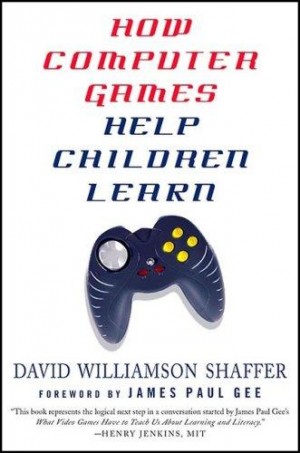Shaffer believes one of the best ways to do this is through what he calls epistemic games: video or computer games that are essentially about learning to think in innovative ways in a post-industrial, global economy and society.
Epistemologies of the Digital Age
Epistemology is the study of knowledge and, according to Shaffer, every age has its own epistemology, i.e., what it means to know something. Computers -- which are increasingly becoming ubiquitous in work and school -- provide the means to think in new ways, which will fundamentally reconfigure our thinking and theories of knowledge. Computers in general, and epistemic games in particular, are structuring new epistemologies for our digital age.
 "The epistemology of School," in Shaffer's words, "is the epistemology of the Industrial Revolution -- of creating wealth through mass production of standardized goods. School is a game about thinking like a factory worker. It is a game with an epistemology or right and wrong answers in which Students are supposed to follow instructions, whether they make sense in the moment or not."
"The epistemology of School," in Shaffer's words, "is the epistemology of the Industrial Revolution -- of creating wealth through mass production of standardized goods. School is a game about thinking like a factory worker. It is a game with an epistemology or right and wrong answers in which Students are supposed to follow instructions, whether they make sense in the moment or not."
While this kind of epistemology may have been appropriate and even innovative for the Industrial Revolution, it is outdated for our informational economy and digital age. Being literate in the digital age uses reading and writing as a foundation to build upon, but they are no longer solely sufficient. Students must learn to produce various kinds of media and learn how to solve problems using simulations.
Epistemic Frames
Epistemic games are organized around epistemic frames. Any profession is structured around a culture that is composed of skills, values, knowledge, identities and an epistemology that anchor how creative professionals operate. Shaffer calls this configuration an epistemic frame: an integral theory of learning that sees how the collection of a profession's knowledge and skills synergistically work together to create a learning community.
Professionals learn to acquire their epistemic frames, i.e., their knowledge and skills, in ways that are very different from traditional classrooms because the creative thinking today's jobs demand require more than knowing a standardized answer. In addition, their thinking, problem solving and communication need to be integrated into the real world of work.
Epistemic Games
One epistemic game Shaffer writes about is SodaConstructor, which uses the epistemic frames of engineering and physics. SodaConstructor lets players construct a virtual creature of their own design and then simulate how that creature would operate once gravity, friction and muscles enter the equation. In order to get their creatures to successfully walk in this virtual world they need to understand a couple fundamental physics and engineering concepts: center of mass and cross bracing. Once key concepts are understood, players then begin to frame their project in a way real engineers creatively think: creating designs, building them, and then testing alternatives as well.
While epistemic games can be fun, their real value lies in allowing individuals to experience worlds they're interested in. "In playing games," according to Shaffer, "[students] are doing explicitly, openly and socially what as adults they will do tacitly, privately and personally. They are running simulations of worlds they want to learn about in order to understand the rules, roles and consequences of those worlds."
Aran Levasseur has an eclectic background that ranges from outdoor education to life coaching, and from habitat restoration to video production. He taught middle school history and science for five years, where he integrated technology into his classes to enhance his teaching and student learning.

The article was originally published by PBS MediaShift, covering the intersection of media and technology. Follow @PBSMediaShift for Twitter updates, or join us on Facebook.




